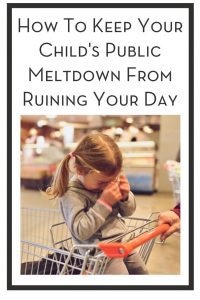Your child has thrown themself on the dirty ground, screaming incoherently, in the middle of the food court. It’s official – this is your child’s public meltdown mode. Your first thought,
“Oh s*@$! People are watching.”
Suddenly it feels like everyone in the food court has stopped in their tracks to watch the public display unfold, to watch YOU.
You are expected to handle this, to correct it, to get it under control.
You kneel and quietly plead with your kid to get off the ground. When that doesn’t work, you offer a desperate bribe,
“If you stop yelling, you can have the cookie we bought.”
But the screaming continues. Your forehead starts getting sweaty, you feel desperate to make the circus show of your child’s public meltdown stop. You feel judging eyes on you.
You decide to show you’re serious (not just to your kid, but to the public watching). No. You are not that parent. You will not let them get away with this disrespect and obvious breach of conduct. You up the game with a threat.
“If you don’t stop screaming right now, you’re going home and straight to time-out.”
Nothing. It’s as though your child hasn’t heard a word you said (spoiler alert: they haven’t). You can no longer ignore the sweat under your armpits – your t-shirt is revealing your stress to the world. Your heart rate is going up. More people are passing by and you feel their judging eyes burning into you. You see thought bubbles above their heads while your child’s public meltdown continues:
“She’s a terrible mom.”
“Her child is out of control.”
Your own tears are coming, and a frantic need to get control over the situation washes over you. You hold that $5 cookie high in the air, shaking it as you threaten,
“If you don’t get up right now, I’m putting this in the trash!”
You count to 5 – and, nothing. Desperate to prove you’re a “good” parent, you know you must follow through, so you triumphantly walk to the trash and put it in. Your child is now throwing their shoes and the tantrum continues.
You angrily scoop up your kicking and screaming child, and storm out of the mall. Both of you need a shower. You need a drink.
Your child’s public meltdown is not how you envisioned your lunch date in the food court.
But does it have to be quite so painful? What if this exact scenario didn’t cause sweat and tears (at least not yours)?
What if you saw your child’s public meltdown through different eyes, and changed the way you think about it?
Consider this:
Instead of thinking…my kid is embarrassing me; I’m a bad parent if I can’t make my kid stop; people are going to think I can’t control my child….
What if you acknowledged a meltdown is a normal reaction to big feelings your child can’t yet manage?
You don’t see a lot of 40-year-olds melting down in the middle of the mall – and that’s because they’ve learned emotional regulation skills. Your child will one day too. Because you’re going to teach them. Your child will be fine.
What if you believed no one would judge you for how you handle the situation?
Or, even better, what if you decide you don’t care if people judge you? You’re not going to risk your relationship with your child to (possibly) impress others.
What if you believed the goal is not to control, but to teach skills?
You can do that when your child isn’t in fight-or-flight mode during their meltdown in public.
What if you understood that when your child is escalated, they literally can’t access their rational brain?
What if you believe your child is struggling and just needs your help regulating?
And lucky kid – unlike their immature brains, your adult prefrontal cortex is fully developed and you can help them work through this and calm down.
What if you thought, this meltdown is no big deal, nothing for me to be embarrassed about?
Take a second. Ponder these two thoughts. Take a moment to gauge the feelings each thought brings on and consider, as a result of that feeling, what action you would take:
1) My child is embarrassing me
2) My child is struggling
For example, for me, when I think “my child embarrassing me” – I start to feel angry and my body tenses up. As a result I may start to act out as I desperately try to control the situation.
However, when I think “my child is struggling” I feel compassionate, supportive. My posture softens and I begin to think of ways to help my child. I then use tools that validate my child’s emotions which deescalates the situation, rather than putting gasoline on the fire.
One simple reframing of how I think about my child’s public meltdown and it’s a whole other ball game.
Learning to manage our own thoughts and emotions, instead of trying to control our kids, is the first step in finding more peace in our homes…and at the food court.














